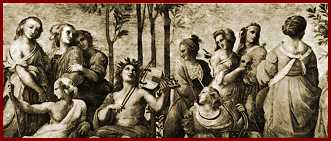Classical References
The Muses
The Muses are nine sisters, daughters of Zeus and Memory, who preside over the arts and philosophy. They reside on Mount Helicon, and are under the patronage of Apollo.In the Classical period, the following names and assignments were accepted, although they may vary (and may be useful when planning Masques).

| Calliope | Poetry |
| Clio | History |
| Polyhymnia | Mime |
| Euterpe | Instrumental music |
| Terpsichore | Dance |
| Erato | Choral music |
| Melpomene | Tragedy |
| Thalia | Comedy |
| Urania | Astronomy |
Other Deities of Our Acquaintance
Morpheus is the winged god of dreams, one of the children of Sleep.Jupiter (or Jove) is the king of the Gods in the Roman pantheon. His Greek counterpart is Zeus. Both are into thunderbolts.
Mars (Ares) is the god of war. Note: Ares the god is not Aries the ram of the Zodiac.
Venus (Aphrodite) is understood to be the goddess of Love; she is married to Vulcan, who forges thunderbolts for Jupiter in a volcano. Her son is Cupid (Eros).
Vulcan (Hephaestus) is lame and ugly; Venus was once caught in flagrante with Mars!
Minerva (Athena) is the goddess of Wisdom. (Yes, we comfortably interchange Greek and Roman names. Hey, it's the Renaissance.)
Iris is the goddess of the Rainbow.
Hermes (her-meez) is messenger of the gods, and has special winged sandals for speed. He is also god of commerce, and speeds travelers on their way.
His son is pastoral Pan, who makes us panic.
Ganymede (gan-ee-meed) is the cup bearer of the gods, and thus any young boy or girl serving at table, or a page.
![]() What Every Schoolboy Knows
What Every Schoolboy Knows
![]() A Classical Education
A Classical Education
Sources
Grimal: The Dictionary of Classical Mythology





27 March 2008 mps
